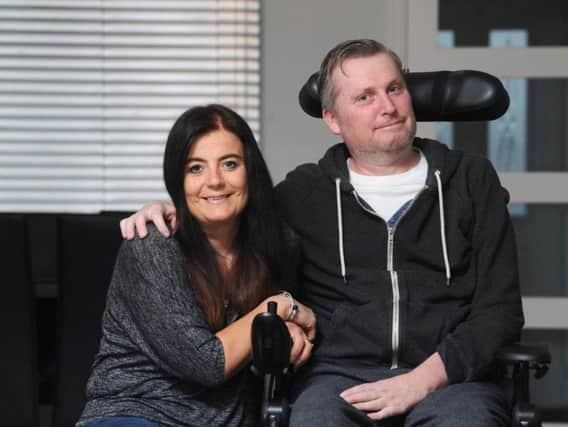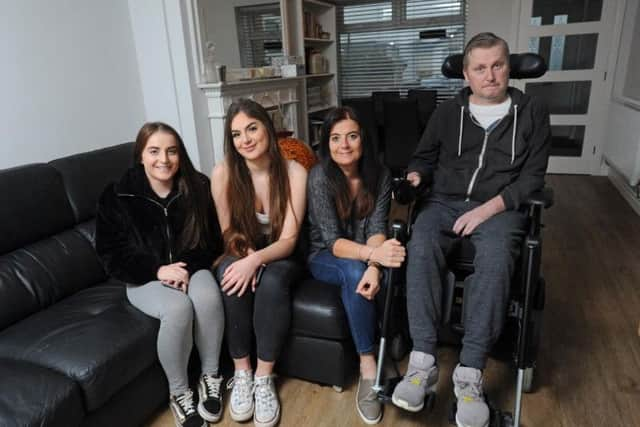Fleetwood man says watching film about Stephen Hawking made him realise he had same incurable condition


They were having a small firework display in the garden for the children - he wasn’t drinking alcohol and there wasn’t anything in his way that he could have stumbled on.
So he just put it down to a simple accident and carried on.
But when the 46-year-old dropped a double glazing unit while carrying out his work as a joiner a few weeks later, he became increasingly concerned.


Advertisement
Hide AdAdvertisement
Hide AdAlan’s wife Helen explained how they had just watched Stephen Hawking’s biographical film The Theory of Everything, and remembered one of the first symptoms of Motor Neurone Disease (MND), which Prof Hawkings suffered from, was dropping things.
The couple, of Marine Parade in Fleetwood, googled the symptoms and there were several explanations about what it could be. They prayed that as long as it wasn’t MND, it would be fine.
Helen said: “We went to the GP and he looked at the muscle between the thumb and forefinger which changes with MND and is a symptom.
“He referred him to a neurologist straight away and was in hospital in Preston for a week having numerous tests, MRI, lumber punctures and tests on his nerves.
Advertisement
Hide AdAdvertisement
Hide Ad“I remember they said that the consultant needed to see Alan and that I should be there too, we almost knew what was coming.”
It was May 2015, just six months after that first fall when the consultant delivered the devastating diagnosis they feared the most. He was told he would live between two and five years.
“Those were the worst two weeks of our lives,” said Helen.
“I had to come home and tell the children, they were so upset, we cried and we hugged. We needed to do that but now we don’t cry or dwell, we take each day as it comes.”
Alan is now confined to a wheelchair but is a true warrior and battling against all odds.
Advertisement
Hide AdAdvertisement
Hide AdHe said: “The diagnosis, everything, being told there was no treatment and that I was terminally ill with a short lifespan - it was such a shock.”
Alan is one of around 5,000 people living in the UK with the condition, which affects the neurons in the brain and spinal cord.
There are several types of the disease and unlike Alan, it mainly affects the older generation. Alan has Amyotrophic Lateral Sclerosis or ALS, which is the most common form of MND.
The disease manifests itself with weakness and wasting in the limbs, muscle stiffness and cramps.
Advertisement
Hide AdAdvertisement
Hide AdHelen said: “How can you be dying yet nothing can be done about it?
“But we stay positive, our motto is if today is the best he is going to be, then we can’t waste it.
“He’s sharp as anything in his mind which is frustrating but he can’t do anything for himself, it’s a horrible disease, it’s like taking something off you every day, it’s very cruel.
Alan added: “I think the hardest part is knowing you are going to get worse and worse and it’s like being locked into your own body. It’s miserable.”
Advertisement
Hide AdAdvertisement
Hide AdAlan and Helen, along with their three children Sam, Olivia and Emily believe research into the disease is underfunded and want to raise awareness.
They support the national charity Motor Neurone Disease Association, which their nieces raise funds for through running events.
“There are 5,000 people diagnosed every year,” said Helen. “But many die during that year so it never reaches a stage, in numbers, which heightens awareness.”
Their strong family unit has pulled together to support each other and despite all they have to cope with, Sam, Olivia and Emily are succeeding well and carving out their own careers.
Advertisement
Hide AdAdvertisement
Hide AdSam, who is 22 and studying at university, said: “I find being away at university difficult. Not for the usual reasons like learning to cook or washing my clothes, it’s the internal battle between wanting to excel and making dad proud and being away from my family when time is running out and they need me the most.
“Uni are good about it - but no one really understands the devastation MND leaves in its wake.”
For Olivia, who is 17, she is so proud of how her dad’s friends support him. Even though he can’t get out now, they go to see him all the time and that means a lot to her to know he is loved like that.
The youngest member of the family Emily, who is 16 and studying for her A levels, finds it hard to let people get too close to her.
Advertisement
Hide AdAdvertisement
Hide AdShe said: “It’s not because I’m embarrassed or ashamed about being a young carer, but more if they knew it would make it real.”
The family remain upbeat but the future reality is something the family have to face head on.
Alan goes to Trinity Hospice for respite care. He’s looked round the hospice and Helen said that they were terrified of the word hospice at first, but have found it to be a marvellous place.
“We talked about where Alan would like to be when the end comes and we all said that home would be the place to be.
Advertisement
Hide AdAdvertisement
Hide Ad“But now we have seen the hospice, our minds have been changed. It’s set up for people with MND, even down to a pipe patients can bite on to alert staff that they need help.”
“I want to go to the hospice,” said Alan.
“My family will be able to come and stay with me and sleep there.
“We talk about these things, like we are doing now, but then we put them away and think about other things.”
“We are rubbish as a nation when talking about dying,” added Helen.
Advertisement
Hide AdAdvertisement
Hide Ad“We are terrified of it but when you’re faced with it, we have to talk.
“But then the rest of the time we have lots of practical things going on, it keeps us going.”
Helen works a few hours for the civil service and when she is working, Alan’s mum and dad look after him and he has lots of friends who visit to keep him company.
“It has made me realise how lonely old people get, you don’t ever think about how difficult it is,” said Alan. “But I am adamant that I will never ever give up.”
Advertisement
Hide AdAdvertisement
Hide AdHead of community fundraising for the MND Association Denise Davies said: “We are really grateful to Alan and his family for the work they are doing to raise awareness of both motor neurone disease and the MND Association.
“By choosing to share his story, Alan is helping to spread understanding of this brutal disease which can leave people locked in a failing body, unable to move, talk and eventually breathe.
“As an association, this year marks our 40th anniversary and our work continues, funding co-ordinated care, campaigning on behalf of people affected by MND, and funding and promoting research into treatments and ultimately a cure for this disease.”
Family and friends are rallying to raise £20,000 online towards extra equipment which will help make Alan more comfortable and fund one last family holiday together in place where Alan will be safe.
To donate, visit www.gofundme.com/making-memories-to-last-a-lifetime